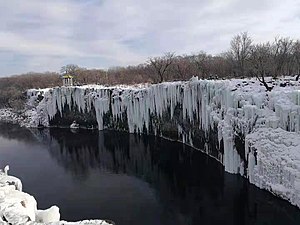geo.wikisort.org - Mountains
Jingpo Lake or Lake Jingpo[1] (Chinese: 镜泊湖; Pinyin: Jìng Pō Hú) is a lake located in the upper reaches of the Mudan River among the Wanda Mountains in Ningan County, Heilongjiang Province, in the People's Republic of China. Earlier names for the lake include Meituohu Lake (湄沱湖), Huhanhai Lake (忽汗海), and Bilten Lake (Manchurian: ᠪᡳᠯᡨᡝᠨ; Chinese: 畢爾騰湖).
| Lake Jingpo | |
|---|---|
 | |
 Lake Jingpo | |
| Location | Ningan County, Heilongjiang |
| Coordinates | 43°52′48″N 128°56′24″E |
| Basin countries | China |
| Max. length | 45 km (28 mi) |
| Max. width | 6 km (3.7 mi) |
| Surface area | 95 km2 (37 sq mi) |
| Max. depth | 62 m (203 ft) |
| Jingpo Lake | |||||||||||
|---|---|---|---|---|---|---|---|---|---|---|---|
| Traditional Chinese | 鏡泊湖 | ||||||||||
| Simplified Chinese | 镜泊湖 | ||||||||||
| Literal meaning | "Mirror Lake" | ||||||||||
| |||||||||||
The length of the lake from north to south is 45 kilometers (28 mi) and the widest distance between east and west is only 6 kilometers (3.7 mi). The area is 95 km2 (37 sq mi) and the storage capacity is 1.63 billion m3. The south part of lake is shallow with the deepest place in the northern part at 62 meters (203 ft).
The winter average temperature in Heilongjiang Province is below -20°C (-4°F), but the temperature at the bottom of the water is always above 10°C (50°F).[2]
On Titan, the largest moon of the planet Saturn, there is a large surface body of liquid hydrocarbons, Jingpo Lacus, named after Jingpo Lake.
Formation
The lake was created about 10,000 years ago when the lava of volcanic eruptions in the region blocked the flow of the Mudan River. Jingpo Lake has experienced five volcanic eruptions.[3] It is the largest alpine lava barrier lake in China.[4]
Natural resources
The northern side of the river cascades down the Diaoshuilou Falls, a 40 m (130 ft) waterfall formed by the lake. This lake is famous for its craggy limestone cliffs (similar to those of Guilin) and its turquoise-colored waters containing 40 types of fish and fresh water coral.
In the southern side of the lake, there are river deltas formed in the estuary of Mudan River and its tributaries. This topography supports a large number of plankton to survive, so it is suitable for the growth of fish. There are various kinds of freshwater fish in Jingpo Lake. The most famous one is Red-tailed fish, also known as White Cloud Mountain minnow (Tanichthys albonubes).
The lava stone also provides a good environment for rice to grow due to its ability to absorb heat.
Cultural landscapes
Jingpo Lake is on the first list of National Park of China. It was approved as a National Geopark of China In August 2005.
On September 18, 2006, Jingpo Lake was designated as one of the Global Geoparks by UNESCO.
Gallery
- Diaoshuilou Waterfall in the summer (13 June 2010)
- Diaoshuilou Waterfall at Jingpo Lake during winter
- Jingpohu Lake, Jingpohu Global Geopark, Heilongjiang, China (10 September 2014)
- Sunset on Jingpo Lake
See also
References
- Sometimes mistakenly romanized as Lake Jingbo or Jingbo Lake owing to an unrelated alternate pronunciation of the second character. The name itself is something of a misnomer, as the pō ("lake") properly modifies hú and not jìng.
- 关晓萌. "Amazing China: A huge alpine hot spring". www.chinadaily.com.cn. Retrieved 2021-06-28.
- "黑龙江牡丹江镜泊湖景区介绍_镜泊湖简介". mudanjiang.cncn.com. Retrieved 2021-06-28.
- 关晓萌. "Amazing China: A huge alpine hot spring". www.chinadaily.com.cn. Retrieved 2021-06-28.
External links
На других языках
[de] Jingpo Hu
Der Jingpo Hu oder Jingpo-See (.mw-parser-output .Hans{font-size:110%}镜泊湖, Jìngpō Hú, englisch Lake Jingpo, Birten Lake, Ching-po Hu, Pilteng Lake, Pirton Lake)[1] ist ein See in der Nähe der Stadt Ning’an von Mudanjiang in der nordostchinesischen Provinz Heilongjiang. Sein südliches Ende ist etwa 10 Kilometer von der Grenze zur Provinz Jilin entfernt, von der aus der Mudan Jiang dem See zufließt.- [en] Jingpo Lake
[fr] Lac Jingpo
Le lac Jingpo (chinois simplifié : 镜泊湖 ; chinois traditionnel : 鏡泊湖 ; pinyin : jìng pō hú ; litt. « lac de l'étang-miroir ») est un lac des monts Wanda dans la province du Heilongjiang au nord-est de la Chine. Au Sud du lac, un barrage est établi le long de la route nationale 11 et 201 (G11/G201).[it] Lago Jingbo
Il lago Jingbo (鏡泊湖T, 镜泊湖S) è un lago di origine vulcanica dai fondali alquanto bassi. Si trova a circa quattro ore di auto da Mudanjiang. Sulle sue rive sorgono almeno due centri turistici ed una centrale idroelettrica. Il lago è circondato da vegetazione composta prevalentemente da boschi. Sul lago è possibile effettuare escursioni su piccoli battelli o su motoscafi. La maggiore attrattiva sono le cascate che danno origine al suo estuario. Le cascate si riversano in un anfiteatro di roccia molto chiuso che in origine fu la bocca eruttiva principale di un vulcano.[ru] Цзинпоху
Цзинпоху́[1][2][3], Цзинбоху́[4] (кит. 镜泊湖[2][5], букв. «зеркальное озеро») — озеро в русле реки Муданьцзян[2], расположенное в горах Ваньдашань на территории городского уезда Нинъань городского округа Муданьцзян провинции Хэйлунцзян Китайской народной республики. Находится у поселка Дунцзинчэн, в 110 км от города Муданьцзян. Объём воды — 1,63 км³.[источник не указан 1943 дня]Другой контент может иметь иную лицензию. Перед использованием материалов сайта WikiSort.org внимательно изучите правила лицензирования конкретных элементов наполнения сайта.
WikiSort.org - проект по пересортировке и дополнению контента Википедии



